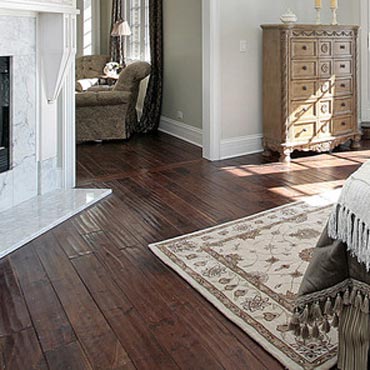Real wood floors made of Maple, Oak, Beech, Elm, and Pecan should be as familiar to you as the countless city streets that are named after these trees. Their rich natural colors and hand-crafted quality is what we have come to expect in our homes. Now, Anderson has taken wood flooring technology to a place it has never gone before—with Best-in-Class durability. Learn More
Unfinished Strip Flooring
Unfinished Strip Flooring Guide

Unfinished Strip Flooring: A Comprehensive Look at a Versatile Option
Introduction
Unfinished Strip Flooring refers to a type of hardwood flooring that is installed in its raw and untreated state. Unlike pre-finished flooring that comes stained and sealed, unfinished flooring provides homeowners and contractors with a blank canvas to work upon. Growing in popularity in both residential and commercial settings, Unfinished Strip Flooring is appreciated for its ability to match existing décor and for its potential customization. It's used in various spaces, ranging from living rooms to high-end boutiques. This paper aims to explore why consumers should consider Unfinished Strip Flooring, diving into its customization options, quality, environmental benefits, economic considerations, flexibility, aesthetic appeal, and potential challenges.
Customization and Personalization
With Unfinished Strip Flooring, homeowners can choose the exact shade and finish they desire, aligning perfectly with their design vision. Matching existing flooring or furniture is easier with unfinished flooring, as it can be tailored to align with current hues and textures. The unfinished nature allows for the creation of unique textures and finishes, enhancing creativity and individual expression.
Quality and Durability
Being usually constructed from solid hardwood, Unfinished Strip Flooring offers robust quality and durability. This flooring type is resistant to wear and can last for decades, given proper care. Unlike pre-finished alternatives, it can be sanded and refinished multiple times, increasing its lifespan. The timeless appeal and quality of hardwood add to the home's overall value, making it a wise investment.
Environmental Benefits
Unfinished flooring can be sourced from sustainable and certified forests, supporting eco-friendly practices. The lack of pre-treatment translates to less waste in the manufacturing process, reducing its environmental footprint. By choosing local woods, consumers can further support sustainability and reduce transportation emissions.
Economic Considerations
Without the need for pre-finishing, initial costs might be lower, although final costs depend on chosen finishes and installation methods. Investing in solid hardwood means long-term value and durability, potentially saving money over time. A wide variety of wood species allows for different budget considerations, accommodating various financial needs.
Installation Flexibility
This flooring type can adapt to different subfloor conditions, providing versatility in installation. While professional installation ensures best results, DIY options are available for those skilled in woodworking. Unfinished flooring can be tailored on-site during installation, ensuring a perfect fit.
Aesthetic Appeal
The natural grains and colors offer a warm and inviting ambiance that suits various interior designs. A multitude of grain patterns and colors provides endless aesthetic possibilities. The timeless elegance of hardwood is versatile enough to complement both traditional and modern interiors.
Challenges and Considerations
Professional or skilled installation is often required to achieve the best finish and fit. Post-installation staining and sealing might be necessary, requiring careful planning and potential additional costs. Regular maintenance is essential to preserve the appearance and integrity of the flooring.
Conclusion
Unfinished Strip Flooring offers unrivaled customization, quality, environmental advantages, economic savings, flexibility in installation, and timeless beauty. Its ability to suit various needs and tastes makes Unfinished Strip Flooring an invaluable choice for many homeowners. Potential buyers are encouraged to consult with flooring specialists or undertake thorough research to make an informed and satisfying decision, enriching their living space with the grace and versatility of Unfinished Strip Flooring.
Disclaimer: The information provided in this article is for general informational purposes only. While we strive to ensure the accuracy and reliability of the information presented, we make no warranties, express or implied, about the completeness, accuracy, reliability, suitability, or availability with respect to the content. Any reliance you place on such information is strictly at your own risk. We recommend consulting with professionals for specific advice tailored to your project’s needs, particularly regarding building codes, regulations, and product specifications.
Under no circumstances shall we be liable for any loss or damage, including without limitation, indirect or consequential loss or damage, arising from the use of, or reliance on, the information provided in this article.
Featured Brands
The Best 3 Unfinished Strip Flooring Brands

Anderson-Tuftex Hardwood
Profile | WebsiteReal wood floors made of Maple, Oak, Beech, Elm, and Pecan should be as familiar to you as the countless city streets that are named after these trees. Their rich natural colors and hand-crafted quality is what we have come to expect in our homes. Now, Anderson has taken wood flooring technology to a place it has never gone before—with Best-in-Class durability. Learn More

Homerwood® Flooring
Profile | Website | Warranty | Install | MaintainChoose from the unparalleled beauty and quality of oak, ash, cherry, hAppalachian Hardwood, lovingly handcrafted into the finest American-made hardwood floors - The Essence of HomerWood. Recalling the age of quality and craftsmanship, we hand select each plank from sustainable, center-cut lumber to reveal the character and unsurpassed beauty created by nature. From these planks we handcraft and custom design exceptional hardwood floors for those who seek style, elegance and individuality. Learn More

Aacer® Sports Flooring
Profile | Website | What's NewAacer® Sports Flooring provides high-performance, MFMA-certified Northern Hard Maple systems. Engineered for durability, athletic safety, and sustainability, these specification-ready solutions support architects and facility managers worldwide. Learn More
Unfinished Strip Flooring News
Latest Unfinished Strip Flooring News
Unfinished Strip Flooring...Unveiling the Charm of Unfinished Strip Flooring: A Timeless Trend in Modern Interiors In the dynamic world of interior design, the choice of flooring plays a pivotal role in defining the character and ambiance of a space. Among the plethora of options available, Unfinished Strip Flooring has emerged as a prominent choice for designers, decorators, and design consultants. This ... |


